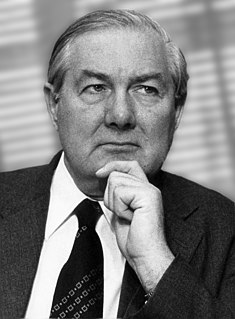A Quote by John Kenneth Galbraith
Broadly speaking, Keynesianism means that the government has a specific responsibility for the behavior of the economy, that it doesn't work on its own autonomous course, but the government, when there's a recession, compensates by employment, by expansion of purchasing power, and in boom times corrects by being a restraining force. But it controls the great flow of demand into the economy, what since Keynesian times has been the flow of aggregate demand. That was the basic idea of Keynes so far as one can put it in a couple of sentences.
Quote Topics
Aggregate
Autonomous
Basic
Been
Behavior
Being
Boom
Controls
Couple
Course
Demand
Economy
Employment
Expansion
Far
Flow
Force
G Force
Government
Great
Idea
Keynes
Keynesianism
Means
Own
Power
Purchasing
Purchasing Power
Put
Recession
Responsibility
Restraining
Sentences
Since
Speaking
Specific
Times
Work
Related Quotes
There's no automatic mechanism in a market system that reconciles the desire to save and the desire to invest. And therefore, the government has to sort of do something or the Federal Reserve, the Fed, or the Central Bank, or whatever, it has to intervene. It has to create enough investment for the economy not to suffer from a fall in aggregate demand. So, if you don't have a balance within the market system itself, then you need an external balance and that's what I think Keynes believed.
The banker, therefore, is not so much primarily a middleman in the commodity "purchasing power" as a producer of this commodity. However, since all reserve funds and savings today usually flow to him, and the total demand for free purchasing power, whether existing or to be created, concentrates on him, he has either replaced private capitalists or become their agent; he has himself become the capitalist par excellence.
We used to think that you could spend your way out of a recession and increase employment by cutting taxes and boosting government spending. I tell you in all candour that that option no longer exists, and in so far as it ever did exist, it only worked on each occasion since the war by injecting a bigger dose of inflation into the economy, followed by a higher level of unemployment as the next step.
Aggregate aid is to the Ethiopian economy what Obama's fiscal stimulus was to the American economy: minus these injections, both economies would suffer catastrophically. The theatrical blustering of the Ethiopian government notwithstanding, donor countries have a make-or-break power over the Ethiopia's prosperity.
Republicans controlled the federal government for decades after the Civil War, and their policies funneled wealth upward -- with dire consequences. In 1893, the economy crashed, and too few Americans had enough purchasing power to revive it. Lincoln had been right: Government that served the wealthy would ruin the country.



































